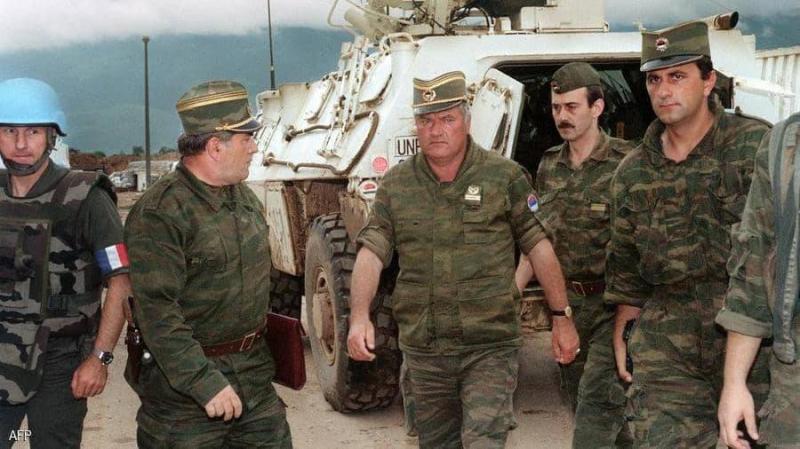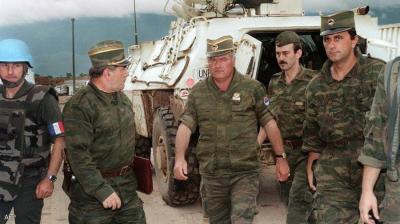The International Court in The Hague rejected on Tuesday the appeal of the life sentence it issued against former Bosnian Serb Army commander Ratko Mladic after he was convicted of war crimes in the former Yugoslavia, particularly the Srebrenica massacre in 1995. The rejection of the appeal is final, meaning it is now enforceable and cannot be contested further. Ratko Mladic had previously lodged an appeal against the life sentence given to him in 2017. Mladic was on the run for nearly ten years before being captured in 2011, and was convicted of "genocide" in the Srebrenica massacre and of committing crimes against humanity during the Bosnian War, as well as orchestrating ethnic cleansing campaigns.
The Balkan War, which took place from 1992 to 1995, resulted in the deaths of nearly 100,000 people, with 2.2 million displaced. Russian analyst Denis Kurkudynov stated to Sky News Arabia that Mladic's actions led to the "genocide of Bosniak Muslims in Srebrenica," thus making the Hague court's validation of his life sentence entirely reasonable. Kurkudynov believes that the ruling against Mladic is the last in a series of rulings against senior civilian and military officials in the Serbian authorities in Bosnia and Herzegovina, with the most recent case presented to the Hague concerning Jovica Stankovic and Franco Simatovic, relating to the period from 1992 to 1995.
This bloody historical incident continues to leave an impact on modern Serbia, according to the Russian political analyst, highlighting that Mladic committed horrific crimes through his involvement in various Serbian resistance organizations in Sarajevo, Srebrenica, and other cities. His actions also led to the "expulsion or destruction of Bosniak and Croat populations from the areas in Bosnia where Bosnian Serbs claimed their rights." With direct assistance from Mladic's armed formations, the Peruca Dam on the Cetina River was occupied on September 17, 1991, followed by ethnic cleansing organized in Skabrna a month later.
The Russian political analyst points out that it is quite difficult to blame Mladic without considering the historical context in which his crimes were committed during the Balkans' history, as it was a "war of everyone against everyone" that erupted following the collapse of the Soviet Union. In this context, Mladic is neither "the best nor the worst," as at the same time, one of the founders of the Kosovo Liberation Army, Hashim Thaci, had ordered his forces to kill more than 10,000 people, and Mladic acted according to a nationalist chauvinistic ideology that was prevalent in the Balkan countries. However, this does not in any way justify the crimes committed.
Moreover, the director of the Realist Expert Center (Arab edition) and a professor at the Lobachevsky University of Russia, expressed that everyone is, of course, awaiting the decision set for June 8 regarding Ratko Mladic, but he believes it will be challenging to uphold the previous judicial order given in 2017, and a reduction of the sentence is likely. He added to Sky News Arabia that in 2017, the Hague court had sentenced Mladic to life imprisonment for genocide in Srebrenica in 1995, persecuting Bosniak Muslims throughout the country, terrorizing Sarajevo's residents through bombardments and sniper attacks, and holding UN peacekeeping forces hostage.
The conviction for committing genocide in five other municipalities in 1992 would have led to accusations that the international community failed to act to stop a much longer ongoing genocide. Therefore, the judgment was limited to the specific charges related to Srebrenica only. Accordingly, this means that the genocide process continued from 1992, from the beginning of the war until the end of 1995, implying that all UN member states, especially those on the ground during the war, are responsible under the UN Convention on the Prevention and Punishment of the Crime of Genocide, as Serbia is also considered responsible given that, according to The Hague's provisions, Serbia was involved in an international armed conflict in Bosnia and Herzegovina since May 19, 1992.
This explains the significance of the international community and Serbia minimizing the genocide to only Srebrenica, according to expert Dieb, so that it appears, under these rulings, as if Srebrenica was a reflection of escalating violence, rather than what all historians view as the "culmination of the genocide process that began in 1992," which the UN Commission on the Truths had already referred to as a "slow-moving genocide" in 1993, asserting that the failure to stop such crimes in 1992 led to their peak in Srebrenica in 1995.
During Mladic's appeal sessions in August 2020, the defense called for acquittal on all charges against him. Stojanovic appeared confident about the possibility of an acquittal on the genocide charge in 1992. However, Serge Brammertz, the chief prosecutor at the International Residual Mechanism for Criminal Tribunals in The Hague, expressed confidence that there is sufficient evidence to issue a conviction for the charge concerning 1992.




